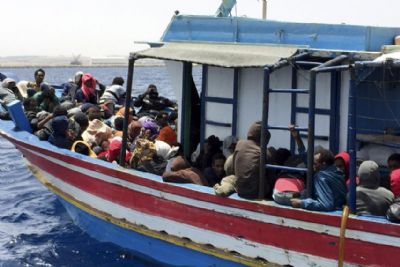UN Authority Figures
UN Human Settlements Programme (UN-HABITAT)
Governing Council: Libya
 |
| Refugees and migrants face rape, torture and abduction for ransom by human traffickers in Libya, forcing many to make the dangerous journey by boat to Europe. Abuses also take place inside immigration detention centers, where migrants live in deplorable conditions and often suffer from health problems like scabies and dehydration. Source: Newsweek, May 10, 2015 |
Mission of the UN Human Settlements Programme (UN-HABITAT): "Habitat's mandate was strengthened and its status elevated to a fully-fledged programme in the UN system, giving birth to UN-Habitat, the United Nations Human Settlements Programme.... It is through this structure and mandate that UN-Habitat contributes to the overall objective of the United Nations system to reduce poverty and to promote sustainable development. " (UN-HABITAT website, "Our Mission")
"UN-HABITAT's Land and Tenure Section ... helps governments, local authorities and civil society partners around the world develop land management and tenure systems, policies and legislation that help achieve adequate shelter, security of tenure and equal access to economic resources for all, with a specific focus on gender equality. The main focus areas and mandate are: Implementation of land, housing and property rights, particularly women's secure tenure, affordable land management systems and pro-poor flexible types of tenure. " (UN-HABITAT website, "Land, Tenure & Property Administration")
Libya's Term of office: 2017-2020
Libya's Record on Sustainable Human Settlements:
"Other human rights abuses included ... abuses of internally displaced persons, refugees, and migrants... Civil society and media reports claimed both sides committed human rights abuses in the western part of the country, including ... burning of houses.. Political instability and escalating violence created an inhospitable environment for internally displaced persons [IDPs], refugees, and migrants seeking to go to Europe by sea... As the security situation deteriorated throughout the year, the fear of detention, lack of opportunity, and violence pushed an ever-growing number of migrants and refugees to undertake the crossing to Europe... By August observers believed that an estimated 77,000 migrants arriving in Italy had departed from Libya, a passage on which more than 100,000 persons were rescued between January and October, with an estimated 2,500 to 3,000 lives lost at sea. For example, on August 22, a boat with 270 passengers capsized off the coast of Garibouli to the east of Tripoli, killing 251 migrants. In-country Movement: At the beginning of the year, the GNC [General National Congress] restricted freedom of movement within the country. The law declaring much of the southern part of the country a 'closed military zone' remained in effect.".. IDPs continued to be vulnerable to abuses. Neither the HoR [House of Representatives] nor its predecessor, the GNC, was able to promote adequately the safe voluntary return or resettlement of IDPs. Due to the lack of adequate laws, policies, or government programs, international organizations and NGOs assisted them... 36,225 refugees and asylum seekers as of May 15. The overall figure included 18,514 Syrians, 5,201 Palestinians, 3,094 Iraqis, 4,470 Eritreans, and 12,319 Somalis... Migrants and refugees also faced abduction, extortion, violent crime, and other abuses, exacerbated by entrenched racism and xenophobia. Government-affiliated and nongovernment militias regularly held refugees and asylum seekers in detention centers alongside criminals or in separate detention centers under conditions that did not meet international standards. A June 22 report ... indicated guards in migrant detention centers under government control tortured and otherwise abused migrants and asylum seekers, including with severe whippings, beatings, and electric shocks. Reports of civilians using migrants for extortion also emerged. Libyan civilians took migrants from detention centers, extorted their families for money, and returned them to the detention centers."
(U.S. State Department's Country Report on Human Rights Practices 2014, Libya)
